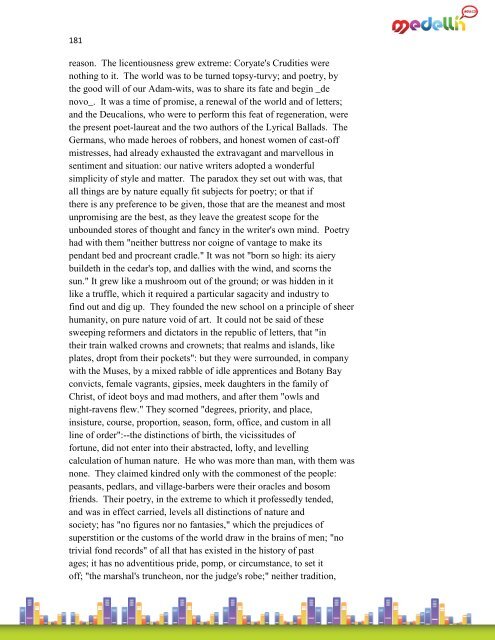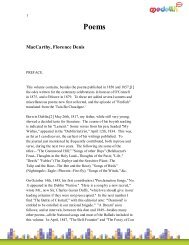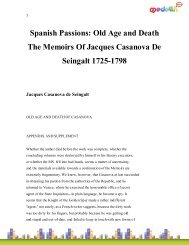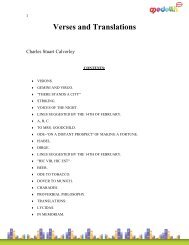Lectures On The English Poets William Hazlitt
Lectures On The English Poets William Hazlitt
Lectures On The English Poets William Hazlitt
Create successful ePaper yourself
Turn your PDF publications into a flip-book with our unique Google optimized e-Paper software.
181<br />
reason. <strong>The</strong> licentiousness grew extreme: Coryate's Crudities were<br />
nothing to it. <strong>The</strong> world was to be turned topsy-turvy; and poetry, by<br />
the good will of our Adam-wits, was to share its fate and begin _de<br />
novo_. It was a time of promise, a renewal of the world and of letters;<br />
and the Deucalions, who were to perform this feat of regeneration, were<br />
the present poet-laureat and the two authors of the Lyrical Ballads. <strong>The</strong><br />
Germans, who made heroes of robbers, and honest women of cast-off<br />
mistresses, had already exhausted the extravagant and marvellous in<br />
sentiment and situation: our native writers adopted a wonderful<br />
simplicity of style and matter. <strong>The</strong> paradox they set out with was, that<br />
all things are by nature equally fit subjects for poetry; or that if<br />
there is any preference to be given, those that are the meanest and most<br />
unpromising are the best, as they leave the greatest scope for the<br />
unbounded stores of thought and fancy in the writer's own mind. Poetry<br />
had with them "neither buttress nor coigne of vantage to make its<br />
pendant bed and procreant cradle." It was not "born so high: its aiery<br />
buildeth in the cedar's top, and dallies with the wind, and scorns the<br />
sun." It grew like a mushroom out of the ground; or was hidden in it<br />
like a truffle, which it required a particular sagacity and industry to<br />
find out and dig up. <strong>The</strong>y founded the new school on a principle of sheer<br />
humanity, on pure nature void of art. It could not be said of these<br />
sweeping reformers and dictators in the republic of letters, that "in<br />
their train walked crowns and crownets; that realms and islands, like<br />
plates, dropt from their pockets": but they were surrounded, in company<br />
with the Muses, by a mixed rabble of idle apprentices and Botany Bay<br />
convicts, female vagrants, gipsies, meek daughters in the family of<br />
Christ, of ideot boys and mad mothers, and after them "owls and<br />
night-ravens flew." <strong>The</strong>y scorned "degrees, priority, and place,<br />
insisture, course, proportion, season, form, office, and custom in all<br />
line of order":--the distinctions of birth, the vicissitudes of<br />
fortune, did not enter into their abstracted, lofty, and levelling<br />
calculation of human nature. He who was more than man, with them was<br />
none. <strong>The</strong>y claimed kindred only with the commonest of the people:<br />
peasants, pedlars, and village-barbers were their oracles and bosom<br />
friends. <strong>The</strong>ir poetry, in the extreme to which it professedly tended,<br />
and was in effect carried, levels all distinctions of nature and<br />
society; has "no figures nor no fantasies," which the prejudices of<br />
superstition or the customs of the world draw in the brains of men; "no<br />
trivial fond records" of all that has existed in the history of past<br />
ages; it has no adventitious pride, pomp, or circumstance, to set it<br />
off; "the marshal's truncheon, nor the judge's robe;" neither tradition,

















